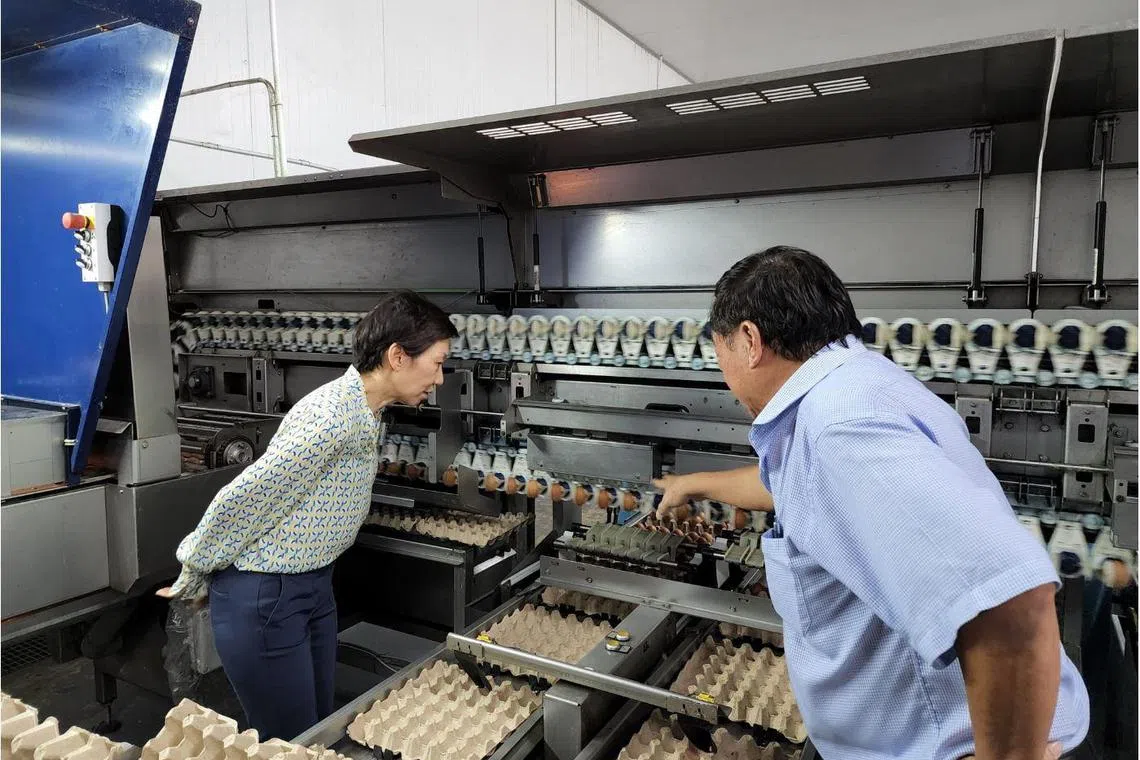Brunei to sell eggs to Singapore, becomes country’s 17th egg exporter
Sign up now: Get ST's newsletters delivered to your inbox

Minister for Sustainability and the Environment Grace Fu at Brunei’s Golden Chick Livestock Farm on Tuesday.
PHOTO: MSE
SINGAPORE - Eggs from Brunei will soon reach local supermarket shelves, as the sultanate becomes the newest exporter of eggs to Singapore.
This takes the number of the country’s egg exporters to 17, including Malaysia, Thailand, Japan, Australia, Spain and Poland.
Adding Brunei to Singapore’s sources for eggs helps the island state diversify its egg import sources further, and the sultanate has been looking to export eggs, said the Singapore Food Agency (SFA) in a statement on Tuesday.
The eggs, which are from Brunei’s Golden Chick Livestock Farm, will be imported by Dasoon Eggs, a local supplier. Dasoon brought in two small shipments of the eggs in November.
“It is better to start with a small consignment to see how all the tests by SFA turn out and also for the Brunei exporter to know the standard Singapore requires,” said Dasoon’s director Sng Kaijun.
During a visit to Brunei’s Golden Chick Livestock Farm on Tuesday, Minister for Sustainability and the Environment Grace Fu said: “Food security is one issue. Food safety is also important for us. So we are here to make sure that the supply meets our high standards in terms of animal and food safety.
“We hope that this accreditation will see new markets for the agri-tech industry in Brunei.”
Efforts to diversify Singapore’s egg sources over the past three years have helped the nation withstand supply disruptions arising from disease issues and geopolitical tensions, said SFA.
Singapore currently has three local egg farms that provide for about 30 per cent of the country’s demand for eggs. That is set to increase to about 50 per cent once a fourth farm is up and running in a few years.
As part of her three-day visit to the sultanate from Tuesday, Ms Fu will have meetings with Brunei’s Minister of Development and Minister of Primary Resources and Tourism to discuss how to strengthen cooperation in agri-food development, environmental protection, water resource management and climate change.
She will also meet officials from Brunei’s Ministry of Culture, Youth and Sports, and alumni of the Singapore-Brunei Youth Leadership Exchange Programme.
In recent years, Singapore and Brunei have collaborated in efforts to boost food security. They include an agreement in August to strengthen trade and investment in food and medical products.
Ms Fu added that while Singapore has increased its egg-exporting countries and regions from 12 in 2019 to 17 now, the next step is to see how local importers, such as Dasoon, are also diversifying their sources.
“So we are working closely with them to implement business continuity plans, to ensure that they are also importing from many countries so that we can diversify as much as we can,” she said.
Mr Sng said: “Brunei is considered near to Singapore. Shipment time is short and we believe acceptability will be high.
“Dasoon has always worked on diversifying its sources to meet consumer needs. It is a requirement for us to have a variety of sources to import from as part of our business continuity plans.”
The majority of Singapore’s imported eggs come from Malaysia, but the amount has been decreasing over the years. In 2019, 72 per cent of imported shell eggs came from Malaysia. That fell to 59 per cent in 2020 and 52 per cent in 2021.
Malaysia is currently having a shortage of chicken eggs,
It was reported that Malaysia’s egg shortage was caused by poultry farms cutting down on production due to the increase in price of maize and soya bean meal.
SFA said eggs imported into Singapore must come from accredited sources that meet the agency’s strict food safety and animal health standards.
As part of the accreditation process, SFA assesses the exporting country’s veterinary services, legislation, animal disease status and control measures, among other things. For example, eggs and poultry can be imported only from bird flu-free regions.
The agency will also assess the farms, such as the Golden Chick Livestock Farm, to ensure they meet food safety standards and animal health requirements. The imported eggs will be inspected before they can enter the market.
It added that it will continue to actively accredit new sources and work closely with the industry to diversify supplies and strengthen resilience.



